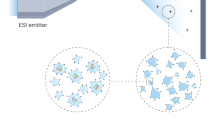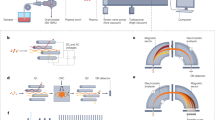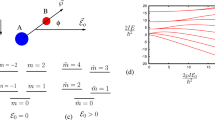Abstract
THE ionization current of the hydrogen flame ionization detector consists of a standing current and a current depending on the concentration of organic components emerging from the column. The standing current i0 is constant when carrier gas velocity and column temperature are constant throughout the experiment. The ionization current due to organic compounds separated on the chromatographic column is a variable and will be denoted by i(t).
This is a preview of subscription content, access via your institution
Access options
Subscribe to this journal
Receive 51 print issues and online access
$199.00 per year
only $3.90 per issue
Buy this article
- Purchase on Springer Link
- Instant access to full article PDF
Prices may be subject to local taxes which are calculated during checkout
Similar content being viewed by others
References
Onkiehong, L., Gas Chromatography, edit. by Scott, R. P. W., 7 (1960).
Desty, D. H., Geach, C. J., and Goldup, A., Gas Chromatography edit. by Scott, R. P. W., 46 (1960).
Lovelock, J. E., Anal. Chem., 33, 161 (1961).
Author information
Authors and Affiliations
Rights and permissions
About this article
Cite this article
VAN DER GRINTEN, P., DIJKSTRA, A. Integration with Ionization Detectors in Gas Chromatography. Nature 191, 1195–1196 (1961). https://doi.org/10.1038/1911195a0
Issue Date:
DOI: https://doi.org/10.1038/1911195a0
This article is cited by
-
Effect of circulation velocity on radiation conversion of an organic coolant at high temperatures
Soviet Atomic Energy (1967)
Comments
By submitting a comment you agree to abide by our Terms and Community Guidelines. If you find something abusive or that does not comply with our terms or guidelines please flag it as inappropriate.



